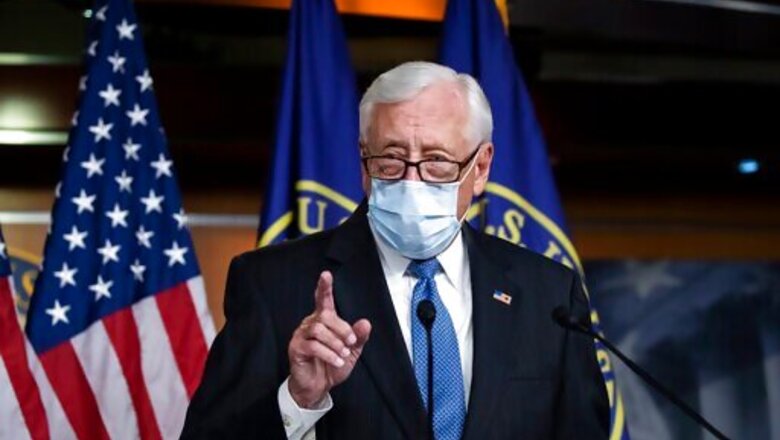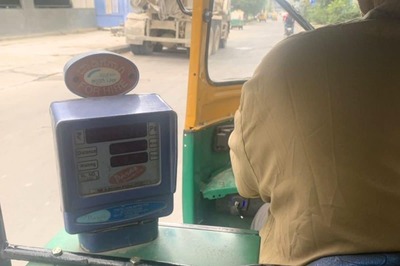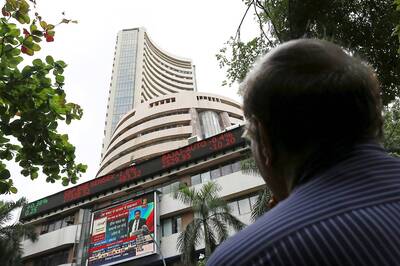
views
WASHINGTON: Top Washington Republicans are convening Tuesday to sort out their end-of-session business on government spending and COVID-19 relief, as they take advantage of an additional week’s time and a moment that’s teed up for potential gridlock-breaking action.
Senate Majority Leader Mitch McConnell, Treasury Secretary Steven Mnuchin and White House chief of staff Mark Meadows are meeting by conference call.
Already, Capitol Hill leaders are moving a government shutdown deadline to the end of next week, but progress is slow and key decisions are yet to be made. And the negotiating dynamic isn’t entirely clear since there are parallel COVID-19 relief talks among both a group of more pragmatic lawmakers and the battle-scarred congressional leadership.
Lawmakers are struggling to figure out how to deliver long-delayed pandemic relief, including additional help for hard-hit businesses, further unemployment benefits, funding to distribute COVID-19 vaccines and funding demanded by Democrats for state and local governments.
A flashpoint is a demand by McConnell, R-Ky., to award businesses and universities, among others, a shield against lawsuits for COVID-related negligence. McConnell and business allies like the U.S. Chamber of Commerce say such suits threaten businesses with financial hardships from opportunistic lawsuits.
Contrary to the majority leader’s dire predictions, there has been no flood of COVID lawsuits. In fact, quite the opposite,” said top Senate Democrat Chuck Schumer of New York. Far from the pandemic of lawsuits, there’s barely been a trickle.”
Separately, House Speaker Nancy Pelosi, D-Calif., and Senate Appropriations Committee Chairman Richard Shelby, R-Ala., spoke by phone on Monday to try to kick start talks on a separate $1.4 trillion government-wide spending bill. That measure is held up over issues like the sage grouse, the Census and accounting maneuvers being employed by lawmakers to squeeze $12 billion more into the legislation.
Leaders had previously told lawmakers that this week would probably be the last of the session, but talks are going more slowly than hoped and both sides were quick to endorse a stopgap measure that would prevent a government shutdown through Dec. 18.
Three main items of legislation are at issue: a defense policy bill that President Donald Trump is threatening to veto; the $1.4 trillion government-wide spending bill; and perhaps $900 billion in long-sought COVID-19 relief.
There are two sets of talks on COVID-19 relief on the leadership level and by a group of Senate moderates occurring at the same time, and it’s unclear how the negotiators might sort themselves out, lending an air of confusion to the process.
The bipartisan Senate group was set to meet again Monday evening. But a long weekend of talks pushed senators apart on one difficult negotiation, the proposed liability protection that has been a priority of McConnell.
Republicans initially proposed a sweeping five-year liability shield, retroactive to December 2019, to protect companies and organizations from COVID-19-related lawsuits. Democrats, along with their allies in labor and civil rights groups, roundly dismissed that approach as a danger to workers.
Sen. Elizabeth Warren, D-Mass., said she wants to make sure were not sacrificing the rights of people who have been made sick or killed by their employers with a pro-corporate liability release.
Lawmakers heard from a coalition of 142 labor and civil rights groups urging them to resist granting companies liability for COVID claims.
Any type of immunity would directly harm Black, Latino, and other workers of color who are overrepresented in essential and in-person, reopened jobs, the coalition wrote in a letter to Congress.
Negotiators suggested a scaled-back liability shield, but a six-month proposal was panned by Republicans and there is no agreement yet from Democrats. The powerful AFL-CIO said Monday it opposes even a short-term liability provision.
It’s clear that McConnell’s Republican majority is demanding the liability protection in exchange for the Democrats’ push for additional money for states and cities battling the COVID-19 crisis.
The leader had made clear that state and local money is tied to liability protection, so theres either going to be none for both of those or both of those are going to be provided for,” Sen. John Cornyn, R-Texas, told reporters. “My hope is well do both.
White House economic adviser Larry Kudlow said Monday that Trump is comfortable with a deal along the lines of one being put together by the group of Senate moderates and pragmatists. That $900 billion plan does not include the direct payments sought by Trump before the election.
Without another round of fresh aid, after the $1,200 checks sent to Americans in spring, lawmakers on the left and right said they would have trouble backing the package.
Sen. Bernie Sanders, I-Vt., said last week he would need direct payments for his support, and GOP Sen. Josh Hawley said Monday that he encouraged Trump to reject any package without them.
I urged him to veto, Hawley said he told the president during a recent phone call.
If an agreement isnt possible on the omnibus bill, lawmakers might have no option but to pass another continuing resolution that would keep the government running on autopilot and permit them to punt the unfinished spending bills into next year.
__
Associated Press writer Lisa Mascaro contributed to this report.
Disclaimer: This post has been auto-published from an agency feed without any modifications to the text and has not been reviewed by an editor
Read all the Latest News, Breaking News and Coronavirus News here


















Comments
0 comment